| Srl | Item |
| 1 |
ID:
183365
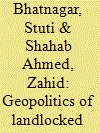

|
|
|
|
|
| Summary/Abstract |
Foreign policies of landlocked states have been a topic of interest for scholarship on international relations but the landlocked states in South Asia have received negligible attention. Due to their geographical realities, South Asian landlocked states that include Afghanistan, Bhutan and Nepal, depend on their neighbours for trade with the outside world. A range of factors place landlocked states in an unequal relationship with their coastal neighbours. While these factors include the superiority of coastal neighbours in terms of economy, population size, and military strength, we argue that their landlockedness plays a crucial role. To further investigate the role of landlockedness, this study compares the foreign policy decisions that guide India-Nepal and Afghanistan–Pakistan relations. Based on the assessment of historical, economic and geopolitical factors, we argue that India and Pakistan exploit their landlocked neighbours to achieve their national interests. Frustrated by the treatment of their coastal neighbours and the presence of new trade opportunities have compelled Afghanistan to use its closeness with India to counter over-dependence on Pakistan and Nepal has enhanced cooperation with China to overcome its reliance on India, thereby creating a new geopolitical dynamic within South Asia.
|
|
|
|
|
|
|
|
|
|
|
|
|
|
|
|
| 2 |
ID:
078015
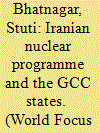

|
|
|
| 3 |
ID:
189441
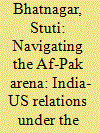

|
|
|
|
|
| Summary/Abstract |
The gradual elevation of India-US relations over the past few decades highlights a significant convergence of interests, a similarity in dominant political discourse and a converging geopolitical environment that has aided this elevation. This article explores engagements between India and the US within the Af-Pak arena, reflected in policy discourse and public pronouncements in both countries. It does so through a critical discourse analysis and examination of personal, national interest, and broader structural calculations that have driven Indian and American policy engagement reflected in their policy positions with regards to Afghanistan and Pakistan.
|
|
|
|
|
|
|
|
|
|
|
|
|
|
|
|
| 4 |
ID:
077770
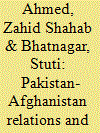

|
|
|
| 5 |
ID:
167691
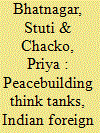

|
|
|
|
|
| Summary/Abstract |
Foreign policy making in India is typically viewed as highly centralised and dominated by the Prime Minister’s Office and bureaucracy. Yet in 2004, the Congress-Party-led United Progressive Alliance government launched a Composite Dialogue with Pakistan which included a place for Indian think tanks in the Kashmir dispute. We suggest that as India liberalised its economy amidst domestic political upheaval, think tanks were given greater access to domestic and foreign funding and adopted new roles in foreign policy making. In the case of the Kashmir conflict, peacebuilding think tanks were encouraged by the government to engage in cross-border activities that would build constituencies for peace with Pakistan and promote economic cooperation as an incentive for peace. While the government aimed to depoliticise the conflict, these think tanks used this opportunity to draw attention to marginalised perspectives and issues. Peacebuilding think tanks nonetheless faced significant challenges in shaping the peace process because of structural constraints regarding access to resources and lack of autonomy to further their agendas. This reflected resistance within the state to depoliticising a conflict that has long been India’s central national security issue.
|
|
|
|
|
|
|
|
|
|
|
|
|
|
|
|
| 6 |
ID:
083885
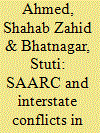

|
|
|
| 7 |
ID:
178398
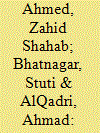

|
|
|
|
|
| Summary/Abstract |
In Kashmir, the worst fallout from the current state of India and Pakistan’s confrontations at the Line of Control (LoC) is the total disregard for the 2003 ceasefire agreement. While political parties, governments and armed forces on both sides of the conflict are key actors in the current dynamics, also stationed on the LoC are military observers as part of the United Nations Military Observer Group in India and Pakistan (UNMOGIP), first instituted in 1949. While India is opposed to the presence of the UN military observers, little is known about the perceptions of the group’s role and its potential capacity to play a constructive role in keeping peace along the border. This research project is an endeavour to gain this understanding based on the views of selected elites and opinion makers in India and Pakistan. The data points to challenges to UNMOGIP’s mandate following the Simla Agreement of 1972 and the change in the status of the ceasefire line to the LoC. Compounded further by the severity of the conflict between India and Pakistan, New Delhi’s opposition to UNMOGIP’s mandate further weakened its operational capacity to effectively monitor and report ceasefire violations.
|
|
|
|
|
|
|
|
|
|
|
|
|
|
|
|